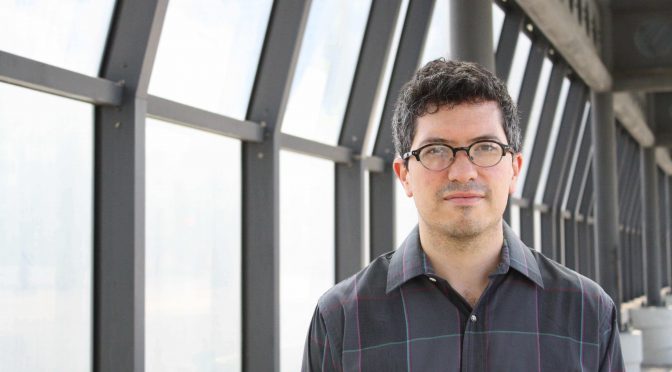
Photo credit: Eric Garcia McKinley
Submitted by Eric Garcia McKinley, Engagement and Inclusion Senior Research Analyst/ACLS Public Fellow
I am now eight weeks into my new job in public media. The position is exactly as new to American Public Media Group as I am: Senior Research Analyst for Engagement and Inclusion (read more about it here). My general assignment is to develop a method for tracking the demographics of sources on which MPR News relies, and to help devise strategies for making news coverage and programming more distinct, diverse, and inclusive.
The work will entail thinking about the broad range of experiences that inform perspectives. I’ll start with some of the things that influence the way I see the world: I am a cisgender straight male in my mid 30s. I am Latino, but I am also white. I don’t speak Spanish. I grew up Catholic, but I’m an atheist. And yet, “Catholic” remains part of my identity. I have a PhD in European history from the University of Illinois, Urbana-Champaign with an emphasis on German and Jewish history (I do speak German, and German Catholics were a part of my research). Politically, I’m liberal with a preference for the word progressive. Identity is complex, and while it can’t be reduced to a set of demographic information, the pieces help. Analyzing demographics is just one way I can help MPR News gain a better understanding of itself and its audiences.
Before getting to that though I have to learn not just what journalists do, but how they do it. So for the past several weeks, I’ve attended daily news huddles, shadowed reporters, and gone into the studios to observe live radio production in action. I attended two tapings of Counter Stories, and I wrote a blog post about about one of them. I was continually reminded of the importance of language when it comes to matters of inclusion.
Every industry and organization has its own vocabulary that makes sense to insiders but might sound strange to outsiders, and public media is no different. But words are more than just industrial quirks. Language can influence action.
One of the first new words I learned was “vox.” I asked someone what it meant, and I learned that it was a news story reliant upon a reporter’s voice. I later learned that the shorthand was “vcr,” for the alternative “voicer.” Someone in the newsroom later sent me a “radio glossary” with more new words.
One word excluded from the list, probably because it’s not a technical term like “voicer,” is “talker.” I always understood the term to mean long-winded, as in “They’re real talkers over there so clear your schedule.” And Seinfeld taught me, years ago, that people can also be “close talkers” and “low talkers.” In public media, people are often divided into “good talkers” and “bad talkers”—judgments regarding whether or not someone can authoritatively speak in clear and concise sentences in a manner that demonstrates investment in the topic, is easy to understand, and is pleasant to hear (at least, that’s a synthesis of what my colleagues have told me). It’s not that “bad talkers” never make it on the air, but they have to hold a powerful position to get there. A politician can be a bad talker and still get air-time. Given the medium of radio, there’s a clear rationale behind the good talker/bad talker dichotomy. Still, I’ve wondered if there isn’t something of a “talker tyranny” that filters out engaging and diverse guests and content. I don’t yet know the nature of it or how to get around it, but I’m thinking about it.
I’m also thinking about how the meaning of words changes. Language evolves. I learned that lesson while writing a dissertation that parsed the meaning of terms like religion, confession, and race over the course of 60 years of German history as part of the process of defining who did and did not belong within the German national body, as well as who decided. Likewise, the definition of terms like diversity and inclusion continually are debated.
Understanding and respecting the history and context of words and how they affect people differently is one way to combat microaggressions—words and actions that may unintentionally reinforce stereotypes but are no less exclusionary because of it. As I write this, MPR employees are participating in workshops about microaggressions and unconscious bias. These trainings should occur in every workplace, but they’re particularly necessary in an industry where the choice of words shapes public dialogue, influences attitudes, and drives behavior.
What else it will it take for MPR News to be more relevant to more people, especially those often marginalized in media? How will the sound and language of public media need to change? For instance, what effect would replacing “good talker” with “inclusive talker” have on the voices and perspectives journalists choose to amplify? This is some of what I hope to learn in collaboration with my colleagues and the broader community.
I’ll be posting here about this process, and I invite you to be part of it. Submit your thoughts, ideas and questions here or email them to emckinley@mpr.org